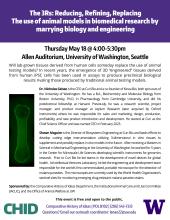When: Thursday May 18, 4:00-5:30pm
Where: Allen Auditorium, University of Washington, Seattle
Will lab-grown tissues derived from human cells someday replace the use of animal testing models? In recent years, the emergence of 3D “engineered” tissues derived from human iPSC cells has been used in assays to produce preclinical biological results rivaling those produced by traditional animal testing models. Curi Bio, Inc. is a Seattle based biotech company focused on advancing both the biology and instrumentation to further improve preclinical data without the use of animal testing. Nick Geisse will give an overview of iPSC-derived 3D tissues used for in vitro experiments with an emphasis on how they are produced and their relevance to in vivo experiments. He will also present specific results of 3D iPSC derived tissue assays and how they compare to existing animal models. Shawn Mcguire will discuss the advances in technology being developed at Curi Bio to increase efficacy and throughput of scientific and clinical research associated with iPSC derived tissues. An overview will be presented of the potential for large increases in the throughput of experiments resulting from the recent confluence of maturing and emerging technologies such as machine learning (AI), inexpensive robotics, and rapid prototyping tools.
Dr. Nicholas Geisse is the CEO at Curi Bio and a co-founder of Kinea Bio, both spin-outs of the University of Washington. He has a B.A., Biochemistry and Molecular Biology from Boston University, Ph.D. in Pharmacology from Cambridge University, and did his postdoctoral fellowship at Harvard. Previously, he was a research scientist, project manager, and product manager at Asylum Research (later acquired by Oxford Instruments) where he was responsible for sales and marketing, design, production, profitability, and new product introduction and development. He started at Curi as the Chief Science Officer and was named CEO in February 2023. At Curi, he guides the overall scientific strategy of the company while developing and bringing to market Curi’s next generation of innovative products aimed at increasing the predictive power of in vitro cell based assays. Nick and his team have been honored by being awarded Xconomy’s 2020 ‘Big Idea’ award, the US Small Business Administration’s 2020 Tibbetts award, and a 2021 Edison Award.
Shawn Mcguire is the Director of Biosystems Engineering at Curi Bio and leads efforts to develop cutting edge instrumentation utilizing 3-dimensional in vitro tissues to supplement and possibly replace in vivo models in the future. After receiving a Masters in Sciencel in Mechanical Engineering at the University of Washington he worked for 5 years in the Center for Microscale Life Sciences developing scientific instruments for genomics research. Prior to Curi Bio he led teams in the development of novel devices for global health. At Intellectual Ventures Laboratory, he led the engineering and development team responsible for the world’s first commercialized, portable microscope for the detection of malaria parasites. The microscopes are currently used by the World Health Organization’s sentinel sites for monitoring emerging drug-resistant malaria parasite strains. Additionally, Shawn was the inventor of the world’s first “freeze-safe” vaccine carrier, which was subsequently approved by the WHO and is used the world over.
